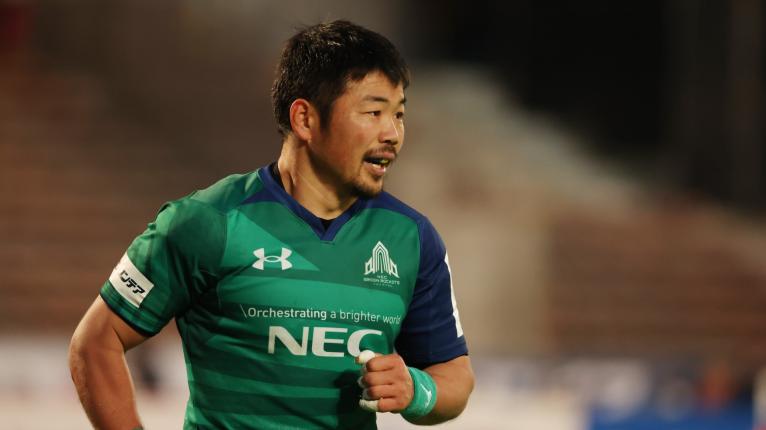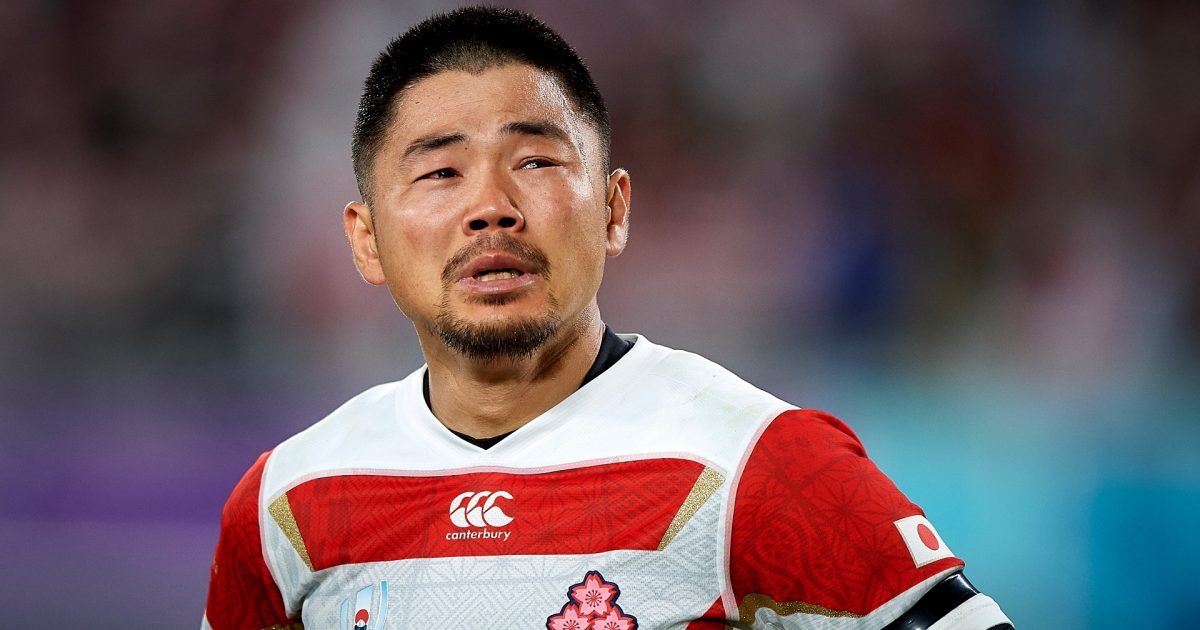Fumiaki Tanaka: 'As a human being, Eddie Jones is very mild now'

It was six in the morning Irish time on Thursday when Fumiaki Tanaka beamed in loud and clear eight hours ahead from Tokyo. Japan’s first match in their second coming under Eddie Jones is on the horizon this Saturday versus England, the team the firebrand coach divorced from in December 2022.
This dynamic of Jones going head to head with his former comrades – including his old Cherry Blossom/Red Rose assistant Steve Borthwick – will ensure that thousands of English fans will rise early to live stream the game on RugbyPass TV.
The fixture will also very much pique the interest of the famed Tanaka, but from a different perspective than was previously the case. It was April 23 when he announced that he would be retiring from playing at the age of 39.
His farewell campaign for the second division NEC Green Rockets Tokatsu didn’t have a happy ending as the club ultimately failed to secure top-flight promotion. But the legendary scrum-half will remain a familiar figure at the Chiba outfit headed up by Wayne Pivac.
His plan? Taking the first steps in his fledgling coaching career, starting in the club’s academy with the grand long-term ambition of eventually becoming the Japan national team head coach. It’s a role that Jones has already predicted Tanaka will definitely achieve at some future stage.
Time for our next Test: @JRFURugby ?
Watch the first match in our #SummerSeries this weekend live from Tokyo on Rugbypass TV ?
Tap below to sign up for free and ensure you’re ready when the whistle blows ??
— England Rugby (@EnglandRugby) June 19, 2024
For now, though, it’s a watching brief, working for a Japanese TV station, and taking notes on how the day one Jones plan works out. It’s a scheme Tanaka got the heads-up on not so long ago as he interviewed his old coach last month with the promotion ramping up ahead of the June 22 National Stadium clash.
Tanaka reckons we are seeing a very different approach from the methods Jones used to ignite the success that was defeating South Africa at the 2015 Rugby World Cup and very nearly qualifying for a first-ever quarter-final appearance that eventually came their way at their home World Cup four years later.
“The style of training is still really hard but as a human being, he is very mild now,” said Tanaka to RugbyPass via his interpreter, his preferred way of conducting the interview even though he picked up some English during his time a decade ago when spending four Super Rugby seasons at the Dunedin-based Highlanders after initially impressing at NPC level for Otago.
“It’s probably the level of Japanese rugby now going up compared to when he was coaching the first time. Probably the understanding among the players is deeper than before. That makes him more comfortable than before. He is not anymore frustrated. That is my impression.
“Especially during the training sessions. There were a lot of mistakes made by players and he was angry at that time and nobody could reach out to him when he was angry, but that hasn’t happened (this time around) from my viewpoint. People can talk to him and he actually reached out to players who have made mistakes. That is the difference I have seen compared to my time as a national team player.”
Will this less cantankerous tactic work the oracle straight away in Test game one? “The Japan team is a really young one and lacking experience, so it’s harder for Japan,” predicted Tanaka.
“England have a very traditional way of playing their game, getting the penalties and taking their kicks and also dominating with their set-piece, which is what I am expecting.
“There are some new players for Japan so they need to be patient with that kind of style of rugby by England. Then, of course, they could have speed in their attack and that might give Japan chances to get some scores. That is what I am hoping.”
Here’s your Japan national team members to take on England in this Saturday’s first summer test ???
? Saturday, 22 June 14:50
? Japan National StadiumFind your seat for the action ?
? https://t.co/nahsVPuljw#BraveBlossoms | #JPNvENG pic.twitter.com/Kn87H2c9Ap— Japan Rugby (@JRFURugby) June 20, 2024
Rugby in Japan now is night and day compared to when Tanaka started on the national side at the age of 23 in 2008. His debut happened against the Arabian Gulf, an Asian Cup match in Osaka that attracted a meagre 4,526 attendance.
“I played for 11 years in the national team and after we had Eddie, the awareness of the game was something that he changed for me, Shota Horie, and all of the other players. We really had a low level of awareness of the game before he joined us and he opened up our eyes to get more eyes onto the many aspects of the game.
“That raised the awareness of the game and helped us to play against all those stronger houses. That was one of the key moments. As for the popularity of rugby after 2015 when we won against South Africa, I felt that people’s attitude to us and also the game of rugby in Japan changed.
“After that game, everyone looked up to us and attention was given to each moment of our game. After that, I felt people really quickly knew about rugby more and more. In the past, it was a very rare occasion for us to see kids with an oval ball or kids and families with jerseys and come to the stadium. Now we can see all these people coming to the stadium when Japan play. That is a very happy thing for us to see.”
Tanaka’s career turned out beautifully, but he was the fortunate one of the five debut-makers in that facile 114-6 win 16 years ago. Two others managed just three-cap careers, another had six games and while the 35-cap Shaun Webb can be considered a success, Tanaka knocked it out of the park despite standing at just 5ft 5ins and weighing a featherlight 75kg.
 Ireland’s Devin Toner with Fumiaki Tanaka in 2017 (Photo by Brendan Moran/Sportsfile via Getty Images)
Ireland’s Devin Toner with Fumiaki Tanaka in 2017 (Photo by Brendan Moran/Sportsfile via Getty Images)
His 75 appearances, which included selection for three World Cups, was a lavish involvement that culminated in the 2019 pool wins over Ireland and Scotland before losing out to the Springboks in the last eight.
“With my understanding of the game, the small size was something that never held me back. So many other small players have played; the likes of Cheslin Kolbe are stars even though they have got very small-sized bodies.
“Even though you are small, if you make the best effort for yourself to understand the game that is going to be your weapon. I couldn’t do that by myself, I was always asking for my teammates, they were like a family and I had always support from them.
“I couldn’t knock over a big-size player by myself, but there were always teammates who could join me in the tackle. There was always someone who could help me in what I wanted to do. It was not only about me. It was the team.”
Aside from representing Japan, Tanaka played for a half-dozen clubs. Which was his favourite? “The Highlanders. I played with them for a while. They are always good to watch.”

And his toughest opposition? “The hardest teams were South Africa and New Zealand. Even though we could be good performers, sometimes we couldn’t do anything we wanted to do. Individual players were also great for those two teams.”
The Springboks would surely say the same of Tanaka given how the 2015 Brighton shock fired up the sport in the Far East. “That game against South Africa was the moment Japan rugby really changed for us and the fans. That was a big moment in my lifetime, the best game for me. I made a lot of mistakes in that game but we still won.”
His boots hung up, it’s now about the future for the diminutive but massive-hearted character. “The first reaction from the people surrounding me after I announced my retirement was really warm and they all said nice words to me.
“They of course celebrated what I did during my career but were also expecting me to keep doing something for rugby after my retirement as a player. That was the reaction to my retirement. I am going be a coach for the NEC academy team and in the long term future, I’d to learn more about coaching and would ultimately like to be the head coach of the Japan national team.
“When I was with Eddie as a player, every day was a chance to learn something from him and his way of thinking. His awareness of the game was something really valuable for me as a player. It taught me there were some things I could improve more.
“But it wasn’t only about him. There were so many other good coaches, including Jamie Joseph. What I would like to do is keep open those connections so I can work with these coaches and be a good coach as well. That is what I’m thinking.”






























































